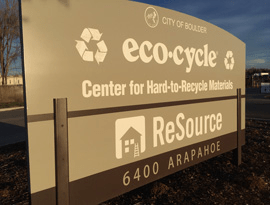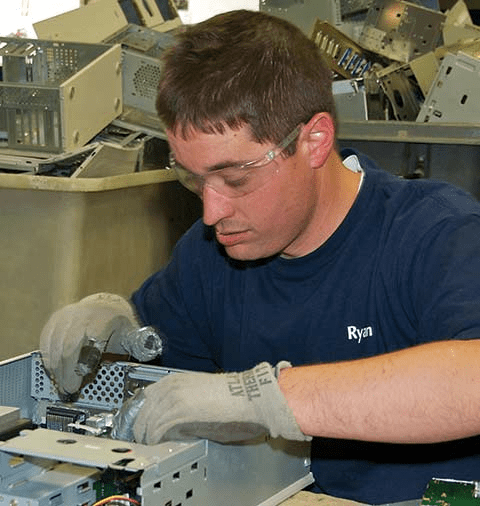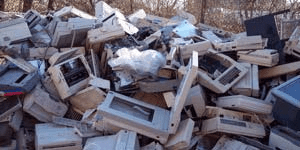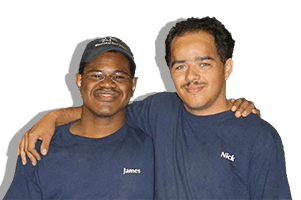e-Waste and Job Creation

e-Waste and Job Creation
Location/Club: Rotary Club of Boulder, Colorado, USA
Keywords: Sustainable economies, Renew, recycle, reuse
Description
How to reduce e-waste while providing jobs to those in need
- The average time Americans keep a computer before replacement is only 4.5 years.
- Americans generate over 2.37 million tons of e-waste each year.
- Each day in the United States, we get rid of 142,000 computers.
- 60% of computer waste, and 67% of monitor waste goes to landfills.
- E-waste represents 2% of America’s trash in landfills, but equals 70% of overall toxic waste. *
The figures are of even greater concern because much of the e-waste that is recycled goes to countries with insufficient regulations, like China, where the e-waste is not recycled properly or dumped as garbage.
In addition to filling landfills with plastic that will not degrade for tens of thousands of years, the dangers of discarded computers are also found in what’s inside them. A typical PC with many circuit boards contains up to eight pounds of lead, along with lower levels of mercury, arsenic, cadmium, beryllium and other toxic chemicals.* There is also a fairly poisonous family of flame-retardant chemicals used in most electronics. In fact, about 70% of the toxic chemicals in landfills come from e-waste.
In response to these serious environmental problems, Eco-Cycle in Boulder, Colorado has developed one of the most successful recycling programs in the country. CHaRM, the division of Eco-Cycle that recycles e-waste, opened in 2001 and was the first facility of its kind in the nation. Eco-Cycle takes extraordinary steps to make sure computers are recycled responsibly and has helped Boulder become one of the top three cities in per capita computer recycling in the nation.
Bill Morris, a social entrepreneur, started Blue Star Recyclers as a non-profit six years ago in Colorado Springs, Colorado. Blue Star has an innovative approach to e-waste recycling that adds the talents of adults on the autism spectrum to the recycling process, creating meaningful work for a neglected population. Blue Star hires adults on the autism spectrum to take apart old computer equipment for recycling. Most people on the autism spectrum are supported while in the K-12 system, but after they turn 21, services are significantly reduced. Most are unemployed and financially dependent on social services.
By hiring adults on the autism spectrum and those with other disabilities, Blue Star proved the following assumptions:
- Many adults with autism are highly skilled at the repetitive task of taking apart computer equipment. They have an attention to detail lacking in the general population.
- By performing competitively paid and necessary work in a positive environment, Blue Star’s employees have found a way to contribute and be appreciated for their talents—something we all need for a meaningful life.
- Because they are paid, some of the cost for the support of autistic adults is removed from society.
In 2015, Bill replicated the Blue Star model in Denver, Colorado. In addition, Blue Star has begun refurbishing salvageable computers for resale for a nominal fee (depending on income) to those in poverty and provide school children who are eligible for free-and-reduced lunch with free computers so they can receive and complete their school assignments.
The Boulder Rotary Club has been instrumental in facilitating a partnership with Eco-Cycle and Blue Star. Leveraging our members’ business expertise, connections, and resources, the club brought Blue Star to Boulder. Eco-Cycle agreed to house Blue Star Recyclers on their campus, and contracted with Blue Star to receive and take apart computers for recycling. The project has been highly successful and serves as a model for recycling in socially and environmentally sensitive ways.
Our goal now is to expand the concept to other communities around the country and internationally. We are presently setting up a recycling facility on the Blue Star model in partnership with a Rotary Club in the Chicago area, and are partnership with a Rotary Club in Jerusalem to set up a recycling facility on the West Bank in the Middle East.
Rotary clubs and computer recycling facilities, advised by the Rotary Club of Boulder, Eco-Cycle, and Blue Star Recycler, will be implementing the Blue Star model for recycling e-waste by hiring employees on the autism spectrum. Please contact me if you would like to bring this concept to your community.
When people broaden their vision, and work not only to achieve their own goals, but the broader goals of a sustainable and compassionate community, great things can happen. The concept works in any community that recycles computers, has a population on the autism spectrum, and a Rotary Club interested in championing the idea. It’s all captured in our motto: “We turn e-waste into work!”



